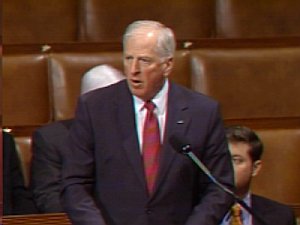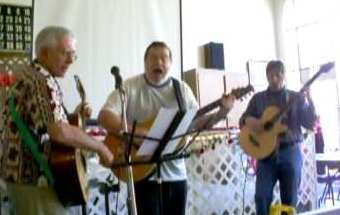
Thompson speaking on the House floor Feb. 14.
WASHINGTON, D.C. — This past week saw Congress debating the president's proposed escalation in Iraq war.
Congressman Mike Thompson was among the more outspoken opponents of escalation.
Last week, leaders of the House of Representatives gave each House member a chance to voice their opinion on the war. Thompson was one of 11 veterans who spoke against President George W. Bush's proposed escalation in the war, which would send 20,000 more U.S. troops into the region.
On Feb. 14, during his turn on the floor, Thompson called for an end to the escalation and demanded a timetable for phased redeployment of U.S. troops out of Iraq.
Thompson urged support of H Con. Res. 63, which states support for the troops but opposes Bush's escalation. He also promoted and explained his recently introduced bill, HR 787, which calls for redeployment to begin on May 1, with all combat brigades out of Iraq by March 31, 2008.
Speaking against the escalation, Thompson said it would put a strain not just on the troops but the military as a whole, with much of the military's equipment already damaged. He said it would require years and billions of dollars to fix the equipment.
“This escalation is in no one’s best interest,” he said.
He told reporters Wednesday that his latest bill is similar to a bill he introduced in the last session of Congress.
It would prevent an escalation in the war without Congressional approval, he said.
"Most importantly, it would require a surge in diplomacy," he said, by creating a special diplomatic envoy position devoted to addressing issues with Iraq.
He said in favor of binding resolution, as well as a deadline to get troops out of the country.
Thompson's bill is companion legislation to a bill introduced in the Senate by Illinois Sen. Barack Obama. The two men, both of whom have been consistent in their opposition to the war, joined forces on the topic and explained their bills in a joint press conference Feb. 6.
Earlier this month, a report by the Congressional Research Service found that in the current session of Congress, 31 bills relating to Iraq War policy have been introduced.
Of those, eight call for withdrawal or “redeployment.”
One of those bills calling for U.S. troop withdrawal is HR 508, authored by Rep. Lynn Woolsey (D-Petaluma). Woolsey's bill stipulates troop withdrawal within six months.
Thompson said he doesn't support that legislation. "I think it's physically impossible.”
He was critical of Australian Prime Minister John Howard's recent remarks about Obama's bill, similar to Thompson's, which Howard said would destabilize the Middle East by withdrawing the troops.
Howard said if he were al Qaida, he would circle March 2008 on his calendar.
"I don't think his comments were appropriate," said Thompson, who added that Australia is a "minor player" in the Iraq war.
The Sydney Morning Herald reports that there are now 1,300 Australian troops in Iraq.
Thompson explained that the U.S. is doing the "heavy lift," with 140,000 troops on the ground in Iraq now, and billions spent. The country with the next-highest number of troops, he said, is the United Kingdom.
The London Daily Telegraph reports there are currently 7,200 British troops in Iraq.
A State Department weekly briefly from last week reported more than 15,000 total coalition troops – in addition to US forces – in Iraq.
Thompson contradicted Howard's assertion that al Qaida is causing the unrest in Iraq; he called the situation there a civil war.
The U.S. military is struggling, he said; it's been unable to meet recruitment demands and retention goals,which has led to lowering standards for soldiers. It also hasn't managed to armor all of its Humvees in Iraq, he said.
The U.S.'s top priority, he said, should be to protect its citizens from terrorists, an effort that he said our presence in Iraq diminishes.
Thompson is critical of how the war is being funded.
"The money for the Iraq war has not come through the budget, ever," he said.
Rather, it has been funded by one emergency supplemental after another, many of them passed with little or no oversight by Congress.
The new leadership in Congress is putting increased emphasis on watching these expenditures, said Thompson.
Although it's a better vetted process, Thompson said, "I still don't like it."
He wants to see it handled as a true budget process, with other spending sacrificed to make the expense real for Americans.
"We're just charging it down the road," he said.
That's a problem, said Thompson, because by 2041 the federal government will take in as much money as it costs to pay the national debt's interest.
Thompson reported that Bush, who has already spent $400 billion on the war, is asking for an additional $240 billion. He said the Iraq Study Group estimates that the final cost of the war will be $2 trillion, which includes ongoing care from thousands of wounded veterans.
The American people, said Thompson, are "ahead of the curve" in opposing the war.
He said if Congress was on the same page as the people it represents, it would be discussing binding resolutions, not nonbinding ones.
"I think we have some catching up to do," he said.
On Friday, Congress voted 246-182 in support of the resolution. By doing so, Thompson said it was the first time since the war started that Congress made an effort to hold Bush accountable “for his bad decisions in Iraq.”
He said Bush's escalation plan would offer nothing different from the past four years of failed policies.
“We should be finding ways to make this war end, not let it go on indefinitely,” he said.
He said the resolution, though nonbinding, was a critical step in getting U.S. troops out of Iraq's “full-blown civil war.”
Thompson said last week's debate was “the first real debate we’ve had on Iraq in more than four years.”
In that week alone, he said, Congress quadrupled the amount of time given to debate of this war since it began.
In an unusual Saturday vote, the Senate decided not to consider the nonbinding resolution against the war in Iraq by a vote of 56 to 34, with 10 members not voting. California Sens. Barbara Boxer and Dianne Feinstein were among the 34 voting “yes” to advancing the resolution.
To see Thompson speaking the House floor last week, click on the following link: Thompson Video
Contact Elizabeth Larson at This email address is being protected from spambots. You need JavaScript enabled to view it..
{mos_sb_discuss:3}


.jpg)












